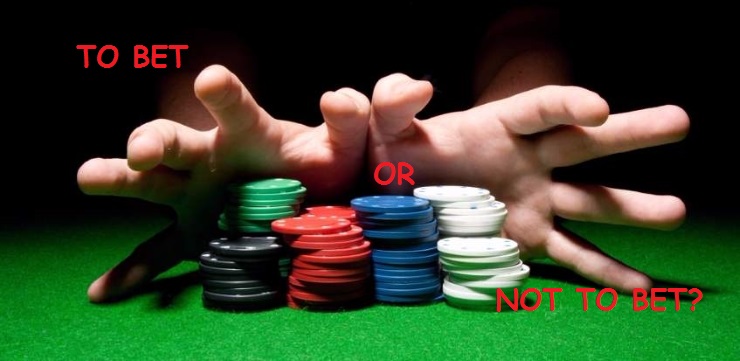2.5 reasons to Bet in No Limit Hold'em
For a very long time, the phrase “Tight - is right” was used in poker. Its essence was the need for careful play, where we entered the game only with strong starting hands and carried out aggressive actions with only powerful made hands. Since the wide spread of the Internet and the emergence of the first poker rooms for playing online poker, the game began to evolve very quickly. New ideas, concepts, strategies and ways of dealing with them emerged.
For some novice players, a large amount of training materials played a cruel joke: they, without understanding the basic and fundamental principles of the game, took and thoughtlessly copied the game model spied in countless VODs and on sites dedicated to poker strategy. As a result, there were fundamental gaps in the thinking of the players, who ran into the ceiling of their own unwillingness to understand the essence of poker deeper. One of the most striking examples of this situation is the lack of understanding by poker players of the reasons for placing bets in poker (types of bets).

Common misconceptions
You can often hear on poker streams or read on any poker forum on a training site the following set of mental stereotypes: “I made a bet to get information about where I am”, “I think I can beat him with a big bet regardless of his hand”, “board contains many possible draws, therefore, I will push right away. " This is especially true for beginners who are trying to imitate the words of advanced players without knowing too much about the issue itself. In fact, poker has long identified fundamental reasons for betting or raising.
2.5 reasons to bet in poker
1) A poker player should bet if he thinks his hand is stronger than his opponent's calling range. This is a value bet. The easiest way to make money is poker. It is thanks to human nature, imbued with curiosity, on the one hand, and unwillingness to be deceived, on the other, that we manage to play profitably and extract value from the mistakes of other players. Poker players are more likely to make bad calls than bad folds. And the more mistakes the opponent makes and the fewer we make, the more positive and profitable the game becomes for us.
2) A poker player should bet if he expects to fold from a hand better than ours. This is a bluff bet. Perhaps the art of bluffing is even more important when playing poker than the ability to collect value from our strong hands. With a huge caveat - not at micro-limits. And with another minor caveat - only after properly leveling the valuebet skill with strong hands.
2.5) The bet for getting dead money. Some renowned players have identified it as a separate subset of reasons for betting or raising. This is due to the fact that when we make a bet with the aim of taking, for example, the blinds, we will not always have a worse hand, but this action cannot be attributed to valuebet either. It contains the features of both a bluff and value bet.
The already mentioned "bet for information" or "bet for defense" is not a real reason to bet or raise. Rather, they are their consequence. After all, when we bet with TP on a dangerous board, we assume that our hand is better, but we reasonably fear being outstripped. Therefore, we will get calls from worse hands aiming to hit their draws and win the hand. In such a situation, the importance of not only the rate itself, but also its size increases.
Ancillary poker software such as poker statistics software (Poker Tracker 4, Holdem Manager 3, Poker Copilot 6 - an analog of Hold'em Manager for MAC OS) greatly simplifies decision making for micro-limit players. And also pay attention to the very beautifully and originally designed Drive HUD tracker.
A high WTSD or Fold to Cbet / Fold to Steal allows poker beginners to make instant decisions about value bet or bluffing, but statistics should not replace a player's thought process. Of course, they can and should be used to maximize value.
However, poker programs serve as an additional tool to facilitate and optimize the player's decision-making. Each time before placing a bet, ask the question: "Why am I bet?" After a certain period of time, your game will transform and, instead of being intuitive, it will evolve into a completely meaningful one.
Andrew Seidman's The Easy Game provides a more detailed explanation of the nature of betting in No Limit Texas Hold'em.





 Log in
Log in  Register
Register 